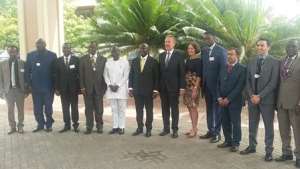
Vice President Dr Mahamudu Bawumia has said for the nation to move beyond aid, there is the need to adopt innovative and strategic approaches in mobilising revenue domestically.
To that end, he said, the Government on assumption of office last year embarked on strategic measures to build a 'soft infrastructure' to ensure the broadening of the tax base.
Those measures included; the rolling out of the National Digital Property Addressing System and the National Identification System to uniquely identify every Ghanaian, while plans was underway to digitise the land registry and titles in October through Land Survey Mapping for easy checking of land title electronically, he stated.
The move, he said, would help state institutions to easily track every Ghanaian through a Tax Identification Number to rope them into the tax net to enhance revenue mobilisation.
Vice President Bawumia said this at the opening of a two-day Conference on Moving Ghana Beyond Aid-Revenue Mobilisation, in Accra on Wednesday.
It was organised by the African Centre for Economic Transformation, the International Monetary Fund and the Ministry of Finance, which attracted policy-analysts, financial experts, economists and development partners.
The two-day conference formed part of the African Compact Programme, which is intended to brainstorm on strategies to boost domestic revenue mobilisation.
It attracted G-20 African countries, including Benin, Guinea, Morocco, Cote d'Ivoire, Egypt, Ethiopia, Rwanda, Senegal, Togo and Tunisia.
Vice President Bawumia said though the path to weaning the country from aid would be arduous and challenging, it was an unavoidable journey, which required concerted efforts from all well-meaning Ghanaians.
He said building 'Ghana Beyond Aid' should not be seen as a mere political rhetoric or platitudes, but government had a clear thinking on what to do, which would translate the vision into policies and strategies to better the lots of Ghanaians.
Dr Bawumia told the gathering that, foreign aid to developing nations had been dwindling since early 1990s, therefore, Ghana could not continue depending on aid perpetually to provide basic infrastructure and social needs to the people, including potable water, good sanitation facilities and healthcare.
He said despite efforts to increase domestic tax revenue, the revenues generated constituted only 17 per cent of the Gross Domestic Product (GDP), which was lower than their peer low-middle-income countries.
The Vice President said it required concerted efforts by citizens of every nation to mobilise domestic revenues towards achieving her development aspirations.
'We need to stand on our own feet, owned our development if we ever hope to build a resilient and capable economy.
'We can debate on and on about what aid has done, could have done and the challenges of aid, but as a country, the key lesson from our past experiences and that of ours, is the awareness of the need for wisdom to recognise when things must change and to act boldly and decisively.
'It has become obvious that we need to be more effective and efficient in managing our resources to ensure rapid economic growth and transformation,' he stated.
Vice President Bawumia said going beyond aid was an inevitable conversation, adding; 'We can choose to confront it now or postpone it at our peril'.
He outlined five pillars of Ghana Beyond Aid, including enhancing domestic revenue mobilisation, encourage high private savings as a source of loanable funds to support domestic credit market to enhance financial inclusion and pursue more transparent, prudent and accountable use and management of public resources.
Others include; leveraging the nation's resources that were buried on the ground for development in more innovative ways than the conventional model of royalties and tax regimes as well as ensure innovative mobilisation and use of external resources in the emerging financial landscape.
Highlighting on enhancing domestic revenue mobilisation, Dr Bawumia said, the government was currently leading a crusade to change the conventional way of revenue mobilisation by roping in hard-to-reach tax segment of the society.
He said the informal sector constituted the larger portion of the economy of most African countries between 30 and 60 per cent of the GDP.
According to the Ghana Revenue Service statistics, only 1.2 million Ghanaians out of the population 27 million were paying taxes.




 NDC demands complete overhaul of security protocols at EC to safeguard electoral...
NDC demands complete overhaul of security protocols at EC to safeguard electoral...
 Ghana reaches interim deal with international bondholders — Finance Ministry
Ghana reaches interim deal with international bondholders — Finance Ministry
 Mahama to form joint army-police anti-robbery squads to safeguard 24-hour econom...
Mahama to form joint army-police anti-robbery squads to safeguard 24-hour econom...
 Another man jailed eight months over shrinking penis
Another man jailed eight months over shrinking penis
 Ghana to adjust external bond deal to meet IMF debt sustainability goals — Finan...
Ghana to adjust external bond deal to meet IMF debt sustainability goals — Finan...
 IMF negotiations: We've not failed to reach an agreement with bondholders; we’ve...
IMF negotiations: We've not failed to reach an agreement with bondholders; we’ve...
 EC begins recruitment of temporary electoral officials, closes on April 29
EC begins recruitment of temporary electoral officials, closes on April 29
 NPP lost the 2024 elections in 2022 due to inflation and cedi depreciation — Mar...
NPP lost the 2024 elections in 2022 due to inflation and cedi depreciation — Mar...
 Your good heart towards Ghana has changed; don’t behave like Saul - Owusu Bempah...
Your good heart towards Ghana has changed; don’t behave like Saul - Owusu Bempah...
 Wa West: NDC organizes symposium for Vieri Ward Women
Wa West: NDC organizes symposium for Vieri Ward Women
